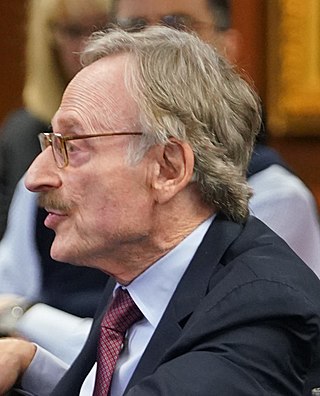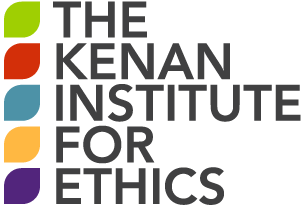Related Research Articles
Business ethics is a form of applied ethics or professional ethics, that examines ethical principles and moral or ethical problems that can arise in a business environment. It applies to all aspects of business conduct and is relevant to the conduct of individuals and entire organizations. These ethics originate from individuals, organizational statements or the legal system. These norms, values, ethical, and unethical practices are the principles that guide a business.

The Hoover Institution is an American public policy think tank which promotes personal and economic liberty, free enterprise, and limited government. While the institution is formally a unit of Stanford University, it maintains an independent board of overseers and relies on its own income and donations. It is widely described as conservative, although its directors have contested the idea that it is partisan.

The Tulane University School of Medicine is the medical school of Tulane University and is located in the Medical District of the New Orleans Central Business District in New Orleans, Louisiana, United States.
Philosophy, politics and economics, or politics, philosophy and economics (PPE), is an interdisciplinary undergraduate or postgraduate degree which combines study from three disciplines. The first institution to offer degrees in PPE was the University of Oxford in the 1920s. This particular course has produced a significant number of notable graduates such as Aung San Suu Kyi, Burmese politician and former State Counsellor of Myanmar, Nobel Peace Prize winner; Princess Haya bint Hussein, daughter of the late King Hussein of Jordan; Christopher Hitchens, the British–American author and journalist; Will Self, British author and journalist; Oscar-winning writer and director Florian Henckel von Donnersmarck; Michael Dummett, Gareth Evans, Philippa Foot, Christopher Peacocke, Gilbert Ryle, and Peter Strawson, philosophers; Harold Wilson, Edward Heath, David Cameron, Liz Truss and Rishi Sunak, Prime Ministers of the United Kingdom; Hugh Gaitskell, Michael Foot, William Hague and Ed Miliband, former Leaders of the Opposition; former Prime Ministers of Pakistan Benazir Bhutto and Imran Khan; and Malcolm Fraser, Bob Hawke and Tony Abbott, former Prime Ministers of Australia. The course received fresh attention in 2017, when Nobel Peace Prize winner Malala Yousafzai earned a place.

The American Political Science Association (APSA) is a professional association of political scientists in the United States. Founded in 1903 in the Tilton Memorial Library of Tulane University in New Orleans, it publishes four academic journals: American Political Science Review, Perspectives on Politics, Journal of Political Science Education, and PS – Political Science & Politics. APSA Organized Sections publish or are associated with 15 additional journals.

Michael Jay Boskin is the T. M. Friedman Professor of Economics and senior fellow at Stanford University's Hoover Institution. He also is chief executive officer and president of Boskin & Co., an economic consulting company, and serves on the Commerce Department's Advisory Committee on the National Income and Product Accounts.
Dennis Frank Thompson is a political scientist and professor at Harvard University, where he founded the university-wide Center for Ethics and the Professions. Thompson is known for his pioneering work in the fields of both political ethics and democratic theory. According to a recent appraisal, he has become “influential within the world of political theory" by offering “greater concrete political thought than Rawls” and by showing “an atypical grasp, for a political theorist, of the real political world.”
The Carnegie Council for Ethics in International Affairs is a New York City–based 501(c)(3) public charity serving international affairs professionals, teachers and students, and the attentive public. Founded in 1914, and originally named Church Peace Union, Carnegie Council is an independent and nonpartisan institution, aiming to be the foremost voice of ethics in international affairs. The Council focuses on Ethics, War and Peace, Global Social Justice, and Religion in Politics as its three main themes. It is separate and independent from all other Carnegie philanthropies.

The McCourt School of Public Policy is one of eleven constituent schools of Georgetown University in Washington, D.C. The McCourt School offers master's degrees in public policy, international development policy, policy management, data science for public policy, and policy leadership as well as administers several professional certificate programs and houses fifteen affiliated research centers. The McCourt School has twenty-one full-time faculty members, ten visiting faculty members, more than one-hundred adjunct faculty members and approximately 450 enrolled students across the various degree and executive education programs.
William Horace Oakland was an American Economist and Economics Professor at Tulane University. Born in Chicopee, Massachusetts, Oakland received his BA in Economics from the University of Massachusetts in 1961 and Ph.D in Industrial Economics from the Massachusetts Institute of Technology in 1965.

Higher education in Alberta refers to the post secondary education system for the province of Alberta. The Ministry of Advanced Education in Alberta oversees educational delivery through universities, publicly funded colleges, technical institutions, and private colleges. These institutions offer a variety of academic and vocational pursuits. Students have access to post-secondary options through most regions of Alberta, and a developed articulation system allows for increased student mobility.

The Kenan Institute for Ethics at Duke University is an interdisciplinary "think and do" tank committed to understanding and addressing real-world ethical challenges facing individuals, organizations and societies worldwide. The Institute promotes ethical reflection and engagement through its research, education and practice in five core areas: Human Rights, Global Migration, Rethinking Regulation, Moral Attitudes and Decision-Making, and Religions and Public Life.

Antonia Darder is a Puerto Rican and American scholar, artist, poet and activist. She holds the Leavey Presidential Endowed Chair in Ethics and Moral Leadership in the School of Education at Loyola Marymount University. She also is Professor Emerita of Educational Policy, Organization, and Leadership at the University of Illinois at Urbana-Champaign.

The MIT Center for International Studies (CIS) is an academic research center at the Massachusetts Institute of Technology. It sponsors work focusing on international relations, security studies, international migration, human rights and justice, political economy and technology policy. The center was founded in 1951.
Steven M. Sheffrin is an economist who focuses on property tax limitations in the United States. He is the Director Emeritus of Tulane University’s Murphy Institute and a professor of economics. Sheffrin is an expert in state taxation and served as a member on Louisiana's state Task Force on the Structural Changes in Budget and Tax Policy in 2016.
The Indonesia Project is a center of research and graduate training on the Indonesian economy at the Australian National University (ANU). It is located in the Arndt-Corden Department of Economics, Crawford School of Public Policy, part of the ANU College of Asia and the Pacific in Canberra. It was established in 1965 with an initial grant from the Ford Foundation.
The Edmond & Lily Safra Center for Ethics is a research center at Harvard University in Cambridge, Massachusetts. The center's mission is to "advance teaching and research on ethical issues in public life." It is named for Edmond J. Safra and Lily Safra and is supported by the Edmond J. Safra Foundation. The Center for Ethics was the first interfaculty initiative at Harvard University.
Charles Wolf Jr. was a senior economic advisor at the RAND Corporation. He was also a senior research fellow at the Hoover Institution at Stanford University and was on the advisory board of the Center for International Business and Economic Research at the UCLA Anderson School of Management. He was a board member of Capital Income Builder and of Capital World Growth and Income, Inc., and a member of the American Economic Association, the Econometric Society, the Council on Foreign Relations, and the International Institute for Strategic Studies in London. He is noted for predicting the economic collapse of the Soviet Union in the 1980s.
Digital civics refers to a range of ethical and responsible civic behaviours, citizenship, or democratic engagement in the digital realm. The term itself is still establishing currency.
Gary A. Hoover is an American professor of economics and director of the Murphy Institute at Tulane University. From January 2015 until December 2020 he was a professor and Chair of the Economics Department at the University of Oklahoma. He was the first and only African American ever hired in that department. In August 1998 he joined the Department of Economics, Finance and Legal Studies at the University of Alabama. He was the first and only African American ever hired in that department, on the tenure track. He was tenured in August 2004 and in 2005 became the Assistant Dean for Graduate Student and Faculty Development in the Culverhouse College of Commerce while maintaining full teaching and research duties. He was granted full professor in August 2010. In March 2017 he founded and became the Editor-in-Chief of the Journal of Economics, Race, and Policy. He has published extensively on race and inequality in the United States, and is a leading scholar on plagiarism and other types of misconduct in the economics profession.
References
- ↑ "Paid Notice: Deaths MURPHY, CHARLES H". The New York Times. 24 March 2002.
- ↑ "About | the Murphy Institute".
- ↑ "Higher-education | Page 8 - NOLA.com". Archived from the original on 2011-07-14. Retrieved 2010-11-30.
- ↑ "Academic Publishing | Academic books, ebooks, reference books and textbooks | Cambridge University Press".
- ↑ "Tulane University - TARP Postmortem: 'Something Had to be Done'". Archived from the original on 2012-04-02. Retrieved 2010-11-30.
- ↑ "Encyclopedia of Arkansas".
- ↑ "The Murphy Institute · The Murphy Institute, 1980-2005". murphy.tulane.edu. Archived from the original on 2005-11-13.
- ↑ "Tulane University names renowned economist Gary Hoover as director of the Murphy Institute".